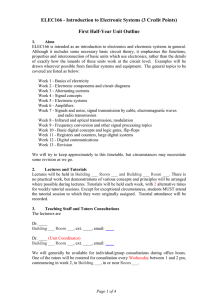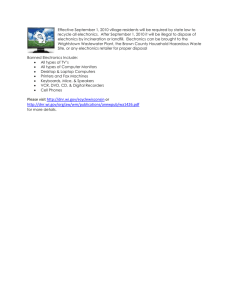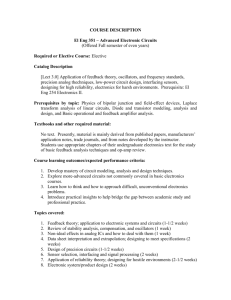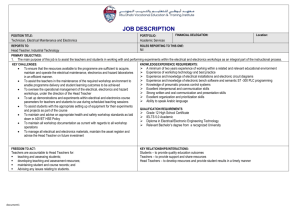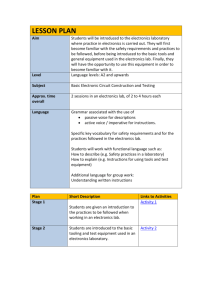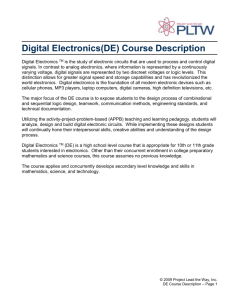ELEC166 - Introduction to Electronic Systems (3 Credit Points)
advertisement
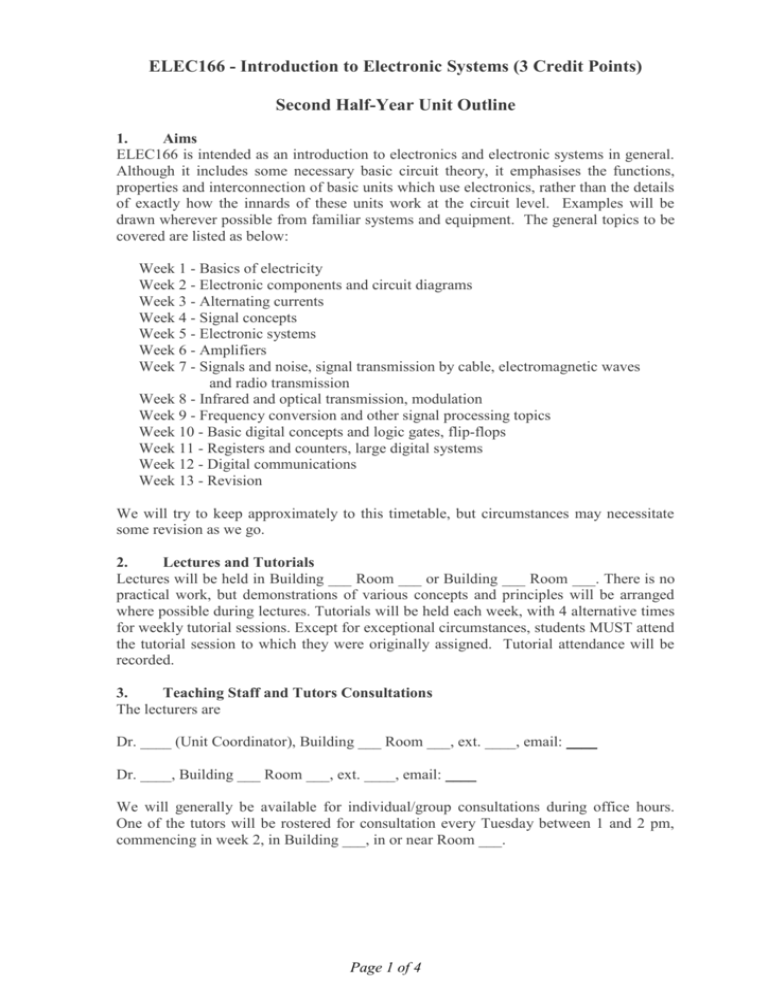
ELEC166 - Introduction to Electronic Systems (3 Credit Points) Second Half-Year Unit Outline 1. Aims ELEC166 is intended as an introduction to electronics and electronic systems in general. Although it includes some necessary basic circuit theory, it emphasises the functions, properties and interconnection of basic units which use electronics, rather than the details of exactly how the innards of these units work at the circuit level. Examples will be drawn wherever possible from familiar systems and equipment. The general topics to be covered are listed as below: Week 1 - Basics of electricity Week 2 - Electronic components and circuit diagrams Week 3 - Alternating currents Week 4 - Signal concepts Week 5 - Electronic systems Week 6 - Amplifiers Week 7 - Signals and noise, signal transmission by cable, electromagnetic waves and radio transmission Week 8 - Infrared and optical transmission, modulation Week 9 - Frequency conversion and other signal processing topics Week 10 - Basic digital concepts and logic gates, flip-flops Week 11 - Registers and counters, large digital systems Week 12 - Digital communications Week 13 - Revision We will try to keep approximately to this timetable, but circumstances may necessitate some revision as we go. 2. Lectures and Tutorials Lectures will be held in Building ___ Room ___ or Building ___ Room ___. There is no practical work, but demonstrations of various concepts and principles will be arranged where possible during lectures. Tutorials will be held each week, with 4 alternative times for weekly tutorial sessions. Except for exceptional circumstances, students MUST attend the tutorial session to which they were originally assigned. Tutorial attendance will be recorded. 3. Teaching Staff and Tutors Consultations The lecturers are Dr. ____ (Unit Coordinator), Building ___ Room ___, ext. ____, email: ____ Dr. ____, Building ___ Room ___, ext. ____, email: ____ We will generally be available for individual/group consultations during office hours. One of the tutors will be rostered for consultation every Tuesday between 1 and 2 pm, commencing in week 2, in Building ___, in or near Room ___. Page 1 of 4 4. Lecture Notes and Other Course Materials Your lecture notes are the basic text. Most course materials (in .pdf format) will be available at the following website: http://online.mq.edu.au, http://www.ics.mq.edu.au/~cl/teaching.html You will need a recent version of the Adobe Acrobat reader to read them. 5. Tutorials The aim of the tutorials is to reinforce learning and skills acquired in the lectures and to give you some practice in solving problems. Each week you will work at designated problems individually. Your work will be checked by a tutor during the tutorial session and you will be awarded 0, 1 or 2 marks according to the following scheme: 0 mark - for no tutorial work and attendance 1 mark - for tutorial attendance 2 marks - for reasonably attempting the problems Solutions to the tutorial problems will be placed on the website in the following week for one week. Note that although you will be awarded marks for the tutorials, they are not primarily intended for assessment purposes; rather, they are there to help you learn, and you should take full advantage of them. 6. Assignments There will be 5 assignments consisting of a number of problems covering the lecture material. Solutions will be placed on the website in the week after each submission is due. Assignments submitted after the due date will not be marked. You are expected to work individually and submit your OWN solutions as instructed on the assignment sheets. Your attention is particularly drawn to the policy on plagiarism as summarised below. 7. Plagiarism The work you submit must be your own, not copied from other students or sources. Clearly, copying does not help students to learn the material (which, hopefully, is the primary aim of this unit). Moreover, it is a very serious breach of University regulations and may result in failing the unit. You should be familiar with the University’s policy on plagiarism, which can be found in the Handbook of Undergraduate Studies.. Where instances of plagiarism are found in this unit they will be penalised. Depending on the circumstances, the penalties could range from the awarding of zero or negative marks for assignments, failure in the unit or referral to the University Discipline Committee. "Group submissions" of assignments will be particularly frowned upon. You have been warned. 8. Assessment Assessment of the unit is based on tutorials, assignments, and the final examination. The various components will be scaled as follows: Tutorials Assignments Final examination Total 15% 15% 70% 100% Page 2 of 4 A satisfactory performance in each component is required. You are formally required to attend at least half of the tutorials and submit 3 of the 5 assignments. In general, if you gain 50% of the total marks, you can safely expect to pass. 9. Final Examination A closed-book written examination of 3 hours duration will be conducted. You will require a scientific calculator for the final exam. Exclusion Students may be excluded from sitting for the examination if they fail to perform satisfactorily in the assignments. Requests for Special Consideration, Special Exams All requests for Special Consideration due to illness, misadventure and so on should be submitted to the Registrar with accompanying documentation, such as a medical certificate, as early as possible; these requests are passed onto the relevant unit coordinator. See Bachelor Degree rule 8: 'Special Examinations' regarding unavoidable disruption to performance in the final examination. Note that students with unsatisfactory results in the tutorials or assignments will not be offered a supplementary examination. In case of disaster… If, through misadventure, you suddenly find you are unable to attend or have missed any exam, the most important thing to do is to contact the lecturer in charge as soon as possible! A delay of even an hour on the exam day can affect the ease with which some alternative arrangement can be made. Of course, a formal request for Special Consideration should be submitted ASAP thereafter. 10. Withdrawal You are reminded that withdrawal on or before the specified date will incur no penalty, including HECS liability. Please refer to the handbook of undergraduate studies for exact date and details. 11. Computer Access If you do not have internet access at home, access to the accounts may be obtained via the: public access computer laboratories on campus including the Library and the Office of Computing Services (OCS) Building E7B Room 146; designated Division computing laboratories for students enrolled in units offered by the Division concerned. For further IT information and other issues, you can contact the IT Support Desk at the Library. 12. Textbook and Reading Lists For further reading, try: M. Tooley, Electronic Circuits: Fundamentals and Applications, 2/e (Newnes 2002) N. P. Cook, Practical Electricity, 2/e (Prentice Hall 2002). H. D. Young and R. A. Freedman, University Physics. D. Halliday, R. Resnick, and J. Walker, Fundamentals of Physics. Page 3 of 4 F. J. Keller, W. E. Getty, and M. J. Skove, Physics - Classical and Modern. R. J. Smith, Electronics - Circuit and Devices, 3/e. Beiser, Basic Mathematics for Electricity and Electronics. Edminster, Electric Circuits. Brophy, Basic Electronics for Scientists. Sedra and Smith, Microelectronic Circuits, 2/e. Ahmed and Spreadbury, Electronics for Engineers, TK 7815.A42. Ahmed and Spreadbury, Analogue and Digital Electronics for Engineers, TK 7815.A419. Alley and Atwood, Microelectronics, TK 7874.A429. Benson, Problems in Electronics with Solutions, TK 7862.B43. Brogan, Semiconductor Electronics by Worked Examples, TK 7871.85B69 Flyod, T. L., Electric Circuits Fundamentals, 4/e, Prentice Hall, TK 454.F559. Horn, Basic Electronics Theory, TK 7815.H69. Horowitz and Hill, The Art of Electronics, 2/e, TK 7815.H67. King, Electronic Circuits and Systems, TK 7867.K56. Lurch, Fundamentals of Electronics, TK 7815.L84. Olsen, Electronics and Electronics Systems, TK 7816.O42. Olsen, Modern Electronics Made Simple, TK 7816.O42. Radio Shack, AC Circuits, vols. 1 and 2, TK 454.15.A48.F8. Ryan, Basic Electricity, 2/e, QC 523.R9. Smith, Circuits, Devices and Systems, TK 145.S616. 13. Useful Websites http://www.ibiblio.org/kuphaldt - Web-based course notes for basic electronics course. http://www.physics.uoguelph.ca/toturials/ohm/index.html - Web-based tutorial for first year undergraduate electronics course. http://emc2.ohm.york.ac.uk/sites/eleccomp.htm - Links to the web pages of most major electronics compaies in the world. 14. Generic Skills If you take full advantage of the lectures, the tutorial sessions, and the set assignments, then you should expect to gain or reinforce the following generic skills: Management of complexity; electronic systems are often very complex, and it is normally necessary to make carefully chosen approximations to analyse them. Mathematical ability; both the theory and the set assignments involve application of mathematics from a range of areas. General knowledge; you will appreciate the background of electronic techniques that have done much to shape the modern world. Time management; Introduction to Electronic Systems builds up a tree of knowledge, and you will need to study regularly to understand and absorb this developing theory. Mike Batty Charles Lee Page 4 of 4
